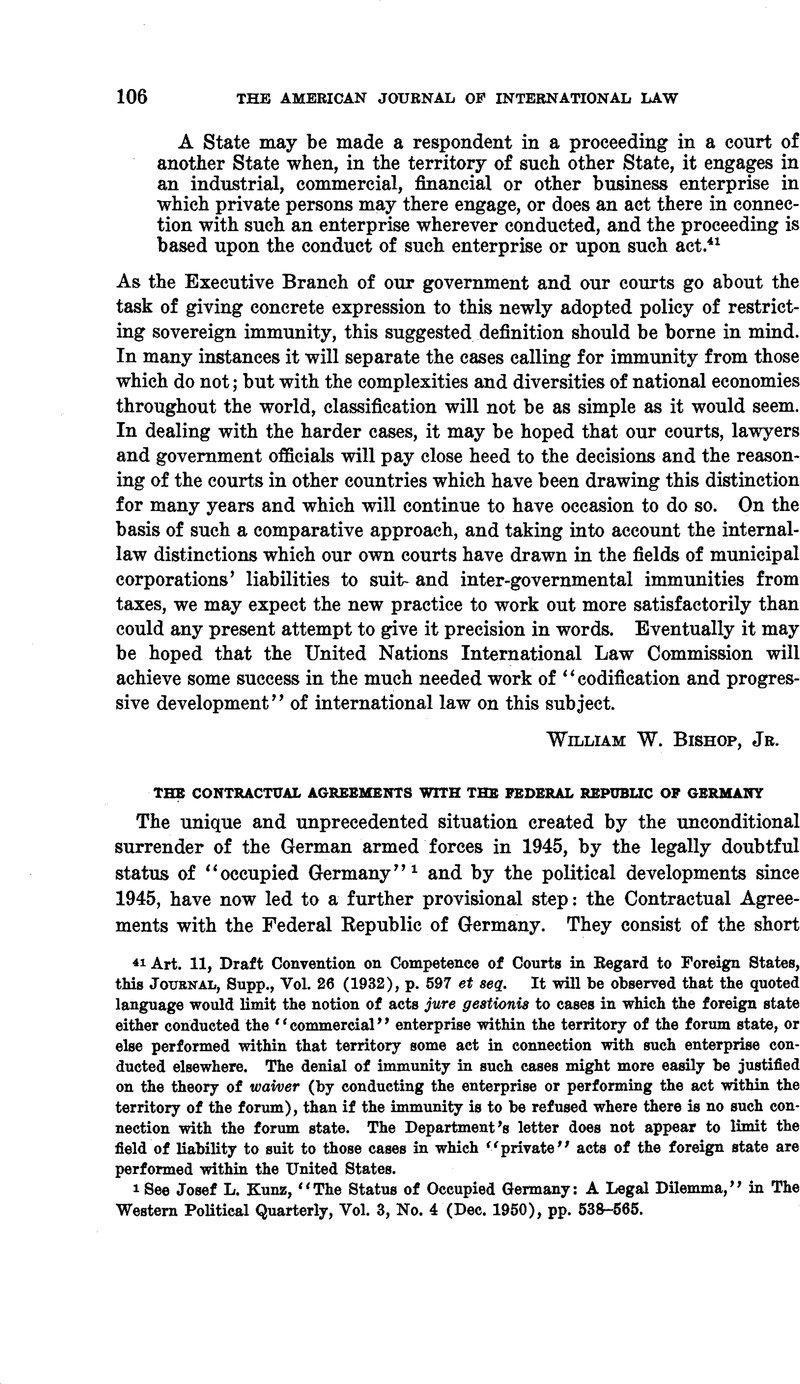No CrossRef data available.
Published online by Cambridge University Press: 20 April 2017

1 See Josef L.Kunz, “The Status of Occupied Germany: A Legal Dilemma,” in The Western Political Quarterly, Vol. 3, No. 4 (Dec. 1950), pp. 538–565.
2 They were transmitted by the President of the United States to the Senate, 82d Cong., 2d Sess., Senate Execs. Q & R (June 2, 1952, Washington), hereafter quoted as Execs. Q & R. See also Hearings before the Committee on Foreign Belations, IT. S. Senate, 82d Cong., 2d Sess., on Execs. Q & R (Washington, 1952, pp. 267), hereafter quoted as Hearings; and the Report of that Committee, Exec. Report No. 16 (Washington, 1952, pp. 58), hereafter quoted as Report.
3 See the strong statement to this effect in the Report, pp. 6, 7; the Report justifies the agreements also with the “great productive power of Germany, its inventive genius, the skills of its people” (p. 35).
4 Thus the Secretary of State (Hearings, p. 5).
6 It was also held that “there is a queer combination; it is a reservation of certain rights which we had, and the rest of it is contractual.” (U. S. High Commissioner for Germany John J. McCloy, Hearings, p. 108.)
6 Senator Hickenlooper (Hearings, p. 169).
7 This point was often raised in the Hearings (pp. 32, 34, 35, 36, 37, 164, 165, 166 and 170).
8 This finds juridical expression in the composition of the Arbitration Tribunal.
9 Public Law 181, 82d Cong., 1st Sess.; this Jouknal, Supp., Vol. 46 (1952), p. 13.
10 Schleswig-Holstein, Hamburg, Bremen, Lower Saxony, North Rhine-Westphalia, Hesse, Rhineland Palatinate, Bavaria, Baden-Württemberg.
11 “The zones, originally devised for administrative purposes, became virtually international boundaries in the case of the Soviet Zone” (Report, p. 5). See also East Germany Under Soviet Control (Department of State Publication 4596, Washington, June, 1952, pp. 95).
12 Report, p. 7.
13 Report, p. 6.
14 The Charter of the Arbitration Tribunal (consisting of twenty-five articles) is contained in Annex B to the Convention on Relations.
15 Namely, the Board of Review (Ch. II); the Supreme Restitution Court (Ch. Ill) and the Arbitral Commission on Property, Rights and Interests in Germany (Chs. V and X).
16 Hearings, p. 147.
17 The Secretary of State (Hearings, p. 14). See also Report, p. 20.
18 Convention on Relations, Art. 2, par. 1.
19 The Secretary of State (Hearings, p. 43).
20 See Hearings, pp. 41, 46, 98.
21 Report, p. 19.
22 Report, p. 46.
23 The Federal Republic will only be restored “to a status which will enable it to play a full and honorable part in the family of nations”; it will “take a further great stride toward independence and self-government.” (Execs. Q & R, pp. 2, 4.) (Italics supplied.) See also the Secretary of State (Hearings, p. 3).
24 The Report “notes that Germany is not yet restored to a status of complete independence” (p. 20) (Italics supplied).
25 See also Convention on Relations, Art. 3, par. 4: “At the request of the Federal Government, the Three Powers will arrange to represent the interests of the Federal Republic in relations with other States and in certain international organizations or conferences, whenever the Federal Republic is not in a position to do so itself.”
26 Hearings, p. 2.
27 See the text of Art. 1, Ch. VI, of the first related convention. Par. 2 starts with the phrase: “Pending the final settlement. …” See also Arts. 1, 2, 3, of Ch. IX: “Without prejudice to the terms of a peace settlement with Germany …”; equally Arts. 3 and 6 of Ch. X: “Pending a final settlement of claims against Germany arising out of the war. …”
28 Art. 7, par. 3.
29 Convention on Relations, Art. 10.
30 Report, p. 10.
31 Convention on Relations, Art. 11.